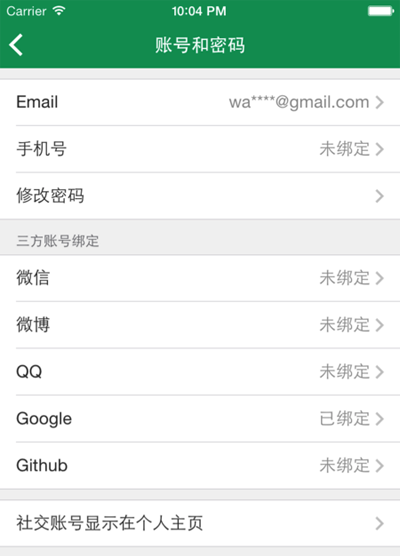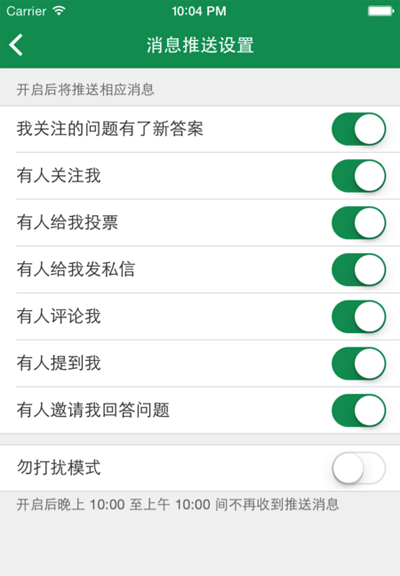序
相信做iOS开发的小伙伴们经常会遇到这样的页面:
对于这样的静态列表我们可以直接用 storyboard 拖一个出来,或者直接用代码创建。我个人的话会选择用代码直接创建,但是之前一直有的问题是没有较好的数据源表示方式,需要对 indexPath 进行硬编码,这导致了在 tableView 的代理里面需要进行判断:
- if (indexPath.section == 0) {
- if (indexPath.row == 0) { // email
- // do something
- } else if (indexPath.row == 1) { // phone
- // do something
- }
- } else if (indexPath.section == 1) {
- // do something
- }
稍微好点的会在相关的判断边上做注释,但是这样写依然容易在往后(产品)调整顺序时调整了一个地方而忘记另外的,总的来说就是代码不够优雅。基于这样的背景,在尝试了各种方式之后,产生了一个可行的解决方案 —— WAMSimpleDataSource。
设计思路
在定义 WAMCellInfo 和 WAMSectionInfo 两个类时我选择引入别名( alias )来解决 indexPath 的硬编码问题(可能有人会说alias也是硬编码,但这样做提升了代码的可读性=0=)。
WAMCellInfo
WAMCellInfo 为 cell 的创建提供了最基本的信息,如 reuseIdentifier ,title,detail。用户也能传入自定义的 cell 而不必担心循环引用的问题。
WAMSectionInfo
WAMSectionInfo 作为 WAMCellInfo 的容器,提供了添加,删除,替换,以及基于 alias 对 WAMCellInfo 和 WAMCellInfo 的索引方法。
WAMDataSource
WAMDataSource 是所有 WAMSectionInfo 的容器,同样提供了添加,删除,替换,以及基于 alias 对 WAMSectionInfo 的索引方法。
Demo
让我们就以一个简单的 demo 看下 WAMSimpleDataSource 在静态列表中如何能让代码看起来更简洁。
- static NSString *const kReuseIdentifier = @"tableViewCellIdentifier";
- static NSString *const kIdentifierCellAlias = @"kIdentifierCellAlias";
- static NSString *const kSelfDefineCellAlias = @"kSelfDefineCellAlias";
- static NSString *const kSectionZeroAlias = @"kSectionZeroAlias";
- static NSString *const kSectionOneAlias = @"kSectionOneAlias";
- #pragma mark - Initialization
- // section info初始化
- WAMSectionInfo *zero = [WAMSectionInfo infoWithCellInfos:@[] alias:kSectionZeroAlias];
- // 添加操作,cell info初始化
- [zero appendingCellInfo:[WAMCellInfo infoWithSelfDefineCell:self.customizedCell alias:kSelfDefineCellAlias]];
- WAMSectionInfo *one = [WAMSectionInfo infoWithCellInfos:@[
- [WAMCellInfo infoWithReuseIdentifier:kReuseIdentifier title:nil detail:nil alias:kIdentifierCellAlias]
- ] alias:@"oneSectionAlias"];
- // data source初始化
- self.dataSource = [WAMDataSource dataSourceWithSectionInfos:@[zero, one]];
- #pragma mark - UITableViewDataSource
- - (NSInteger)numberOfSectionsInTableView:(UITableView *)tableView {
- return self.dataSource.sectionInfos.count;
- }
- - (NSInteger)tableView:(UITableView *)tableView numberOfRowsInSection:(NSInteger)section {
- return self.dataSource.sectionInfos[section].cellInfos.count;
- }
- - (UITableViewCell *)tableView:(UITableView *)tableView cellForRowAtIndexPath:(NSIndexPath *)indexPath {
- WAMCellInfo *cellInfo = self.dataSource.sectionInfos[indexPath.section].cellInfos[indexPath.row];
- __kindof UITableViewCell *cell = [tableView dequeueReusableCellWithIdentifier:cellInfo.identifier forIndexPath:indexPath];
- // 根据不同的alias进行不同的操作
- if ([cellInfo.alias isEqualToString:kSelfDefineCellAlias]) {
- // do something
- } else if ([[cellInfo.alias isEqualToString:kIdentifierCellAlias]) {
- // do something
- }
- .
- .
- .
- return cell;
- }
- - (CGFloat)tableView:(UITableView *)tableView heightForHeaderInSection:(NSInteger)section {
- return self.dataSource.sectionInfos[section].sectionHeaderHeight;
- }
- - (CGFloat)tableView:(UITableView *)tableView heightForFooterInSection:(NSInteger)section {
- return self.dataSource.sectionInfos[section].sectionFooterHeight;
- }
总结与缺陷
现在的 WAMDataSource 还没办法做到直接作为 tableView 的数据源,这是在今后的更新中会解决的问题。虽然 WAMSimpleDataSource 并没有减少很多代码量,但能提升静态列表中代码的可读性以及可维护性,个人觉得还是值得的。





























